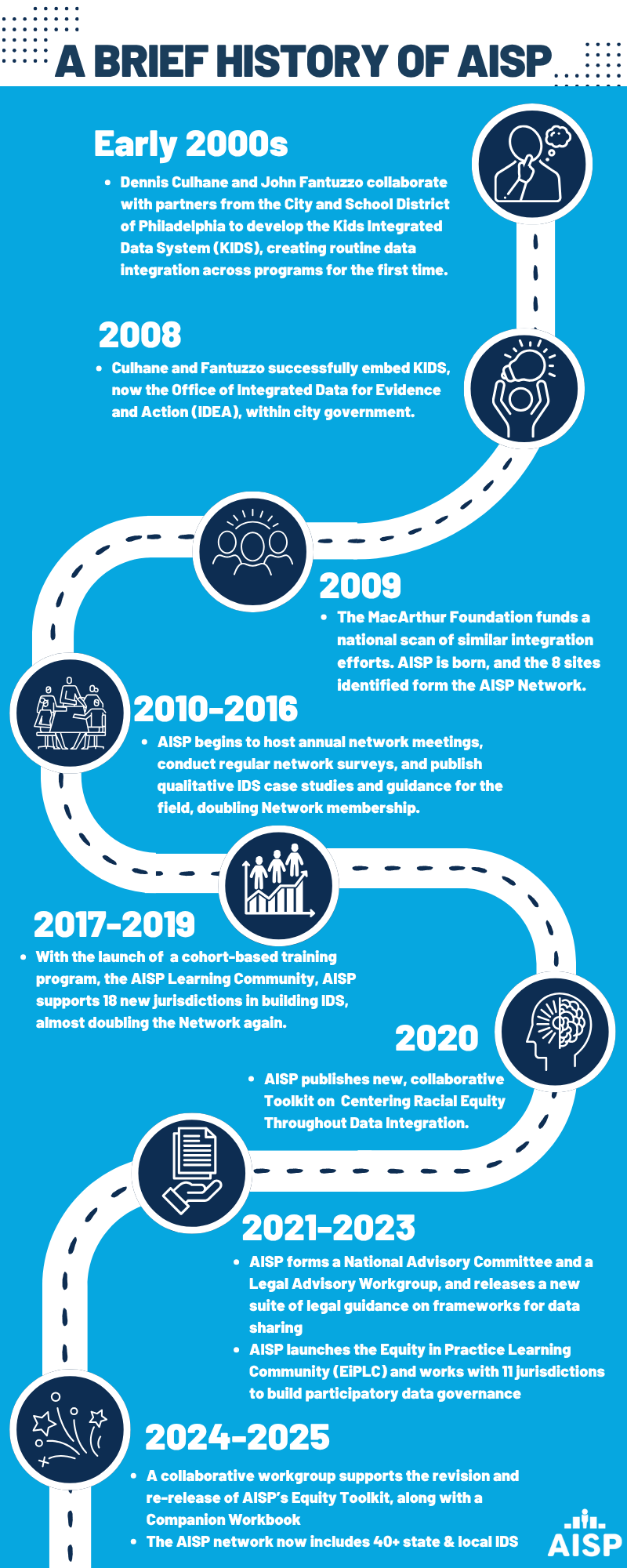Who We Are:
At Actionable Intelligence for Social Policy, we help state and local governments collaborate and responsibly use data to improve lives. We believe collaborations among government agencies and non-profit organizations to responsibly share and use public sector, human services data can improve policies and programs and, ultimately, the lives of the people they serve.
What We Do:
- Convene and advocate on behalf of communities that are sharing and using cross-sector data for good
- Connect to emerging practices, research, and funding opportunities that support ethical data sharing
- Consult with data sharing collaborations to build the human and technical capacity to share data and improve lives
Why We Do It:
When communities bring together cross-sector data safely and responsibly, policy-makers, practitioners, and schools are better equipped to:
- Understand the complex needs of individuals and families
- Allocate resources where they’re needed most to improve services
- Measure long-term and two-generation impacts of policies and programs
- Engage in transparent, shared decision-making about how data should (and should not) be used
Join Us!

Founded in 2009 and housed at the School of Social Policy and Practice at The University of Pennsylvania, Actionable Intelligence for Social Policy (AISP) has become a national leader in integrated data systems (IDS), data governance, and the ethical use of public data. Our story, though, begins years earlier.
In the early 2000s, an unexpected partnership was forged between two University of Pennsylvania faculty members—Dennis Culhane, a social science researcher and leading expert on homelessness at the School of Social Policy & Practice, and John Fantuzzo, an education researcher and leading expert on early-childhood education at the Graduate School of Education. Both born in Rochester, NY (must be something in the water), they each had spent years doing applied research with public sector partners and had developed a unique expertise in the relational and technical aspects of data sharing and the use of linked administrative data. The two first came together on a project for the City of Philadelphia, developing the Kids Integrated Data System (KIDS), along with partners from the School District of Philadelphia and the William Penn Foundation. KIDS was initially housed at the University, and provided linked data for the City’s cross-agency research priorities, with an emphasis on supporting kids and families living in deep poverty. In 2008, the data system was embedded within city government, and it operates to this day as the Office of Integrated Data for Evidence and Action (IDEA).
Although KIDS was one of the first integrated data systems nationally, Culhane and Fantuzzo were aware that similar work was taking place in other cities and counties, and even at the state level. To better understand the landscape, and with the help of a grant from the MacArthur Foundation, the team conducted a national scan and then surveyed the 8 sites they identified that, like KIDS, were routinely linking administrative data across program siloes. They found that this important work was often lonely, consisting of a small group of people in each jurisdiction who were committed to using more holistic data to improve policies and programs, but had few peers or models to guide them. This and other survey findings sparked the idea to connect those working with integrated data to document emerging best practices, and with MacArthur’s support, Intelligence for Social Policy was founded and our Network was born.
Now known as Actionable Intelligence for Social Policy (or AISP)—a nod to our efforts towards actionable change—collaboration continues to undergird our work. Our Network, which includes more than 40 state and local efforts, is a vibrant peer community where members share experiences, problem-solve challenges, and amplify each other’s impact. We also facilitate a Research Exchange to promote cross-sector projects on shared policy priorities, and provide training and technical assistance to developing collaborations. Over the years, we have been generously supported by state and federal partners, as well as foundations like the Annie E. Casey Foundation and Robert Wood Johnson Foundation. Our cohort-based learning communities have grown our Network and the field, and our explicit focus on equity and community voice in data governance have helped shift the narrative. A Toolkit for Centering Racial Equity Throughout Data Integration is in its second edition, and has been used by hundreds of organizations seeking to shift practice across the data lifecycle.
Over the years, AISP’s core tenets have remained steadfast amidst a rapidly evolving landscape. We believe in the transformative potential of public sector data sharing and collaboration because we’ve seen it first hand. Our relational work places emphasis on the human experience, a reflection of our ethos that has been with us since the beginning—centering the people behind the data.
